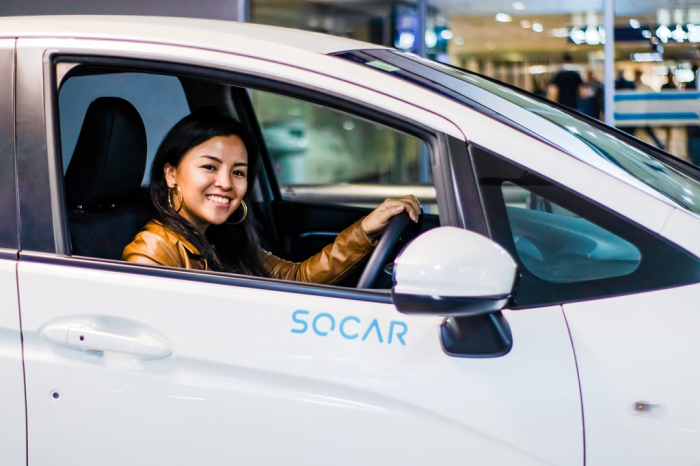
Owning a decent car has long been a status symbol, particularly among youths, in South Korea.
Such days are gone now. Young people, those in their 20s and 30s, more commonly known as millennials or MZers, prefer using a car-sharing service to car ownership.
Latest industry data showed car sharing in the country has overtaken its pandemic-era record, indicating a structural shift in how younger generations use cars as economic pressures and technology adoption reshape mobility.
According to data compiled by alternative data platform KED Aicel on Monday, combined card spending at Korea’s three main car-sharing platforms – Socar Inc., Lotte Rental Co.’s Gcar and Humax Mobility Co.’s Turu Car – reached 247.8 billion won ($178 million) in the first seven months of this year.

That’s the highest level on record, up 2.7% from the same period a year earlier.
The previous peak for the January-July period was 243.3 billion won set during the post-lockdown domestic travel surge of 2022, up 25.3% from the year-earlier period.
SOCAR LEADS THE PACK
Socar, which controls about 80% of the market, is leading the expansion.
Its payment rose 19.2% to 192.4 billion won in the first seven months of this year from two years ago.

Turu Car, Kore’s No. 3 car-sharing platform, posted the fastest growth with a 56.9% jump to 16.7 billion won.
By contrast, use of Lotte’s Gcar contracted over the same period as it struggled to keep pace with rivals’ expansion.
The results are an estimate by KED Aicel of the total payment amount based on data from over 20 million credit card members in Korea.
‘CAR POOR’ STIGMA, DECLINING VEHICLE OWNERSHIP
The industry’s growth is closely tied to falling car ownership among South Koreans in their 20s, 30s and 40s.
Official registration data show that the number of cars owned by drivers in their thirties dropped nearly 15% to 430,000 at the end of 2024 from 510,000 units in 2016.

Those in their 40s declined 8% over the same period to 670,000 vehicles. Even twenty-somethings, once a marginal growth segment, registered a 6.5% fall in ownership to 75,000 units last year.
Analysts said the trend reflects a generational rejection of the so-called car-poor lifestyle, in which high purchase and maintenance costs consume disposable income.
A report by the Korea Chamber of Commerce and Industry (KCCI) found average monthly disposable income among those in their 20s and 30s slipped to 3.47 million won last year, while average annual upkeep for a privately owned car often exceeds half of their disposable income.
“More young consumers are making rational choices and turning to shared mobility instead of committing to car ownership,” said an executive at Socar, which has expanded its nationwide network of car-sharing hubs to more than 5,000.
TECHNOLOGY, CORPORATE ADOPTION FUEL MOMENTUM
Technology has also helped cement car sharing as a mainstream option.

Advances in smartphones, Internet-of-Things devices and artificial intelligence have enabled users to book, unlock and pay for car rental entirely digitally, often in increments as short as 10 minutes.
Companies are beginning to follow suit.
Korea Electric Power Corp. (KEPCO), the state-run utility, introduced car-sharing for its staff in May – the first public enterprise to do so.
KEPCO expects to save about 9 billion won annually compared with buying and maintaining a corporate fleet.
Globally, the market is on track for rapid expansion.
Research group IMARC estimates that the car-sharing industry will grow to $24.4 billion in annual market size by 2033 from $8.93 billion in 2024, driven by cost-conscious consumers and the continued rollout of digital infrastructure.
By Tae-Ho Lee
thlee@hankyung.com
In-Soo Nam edited this article.















